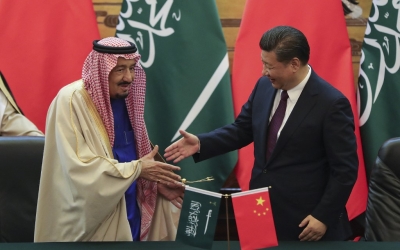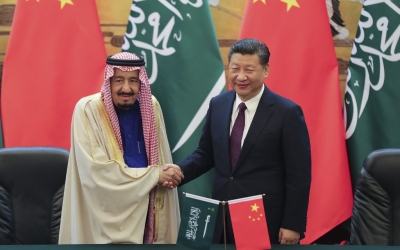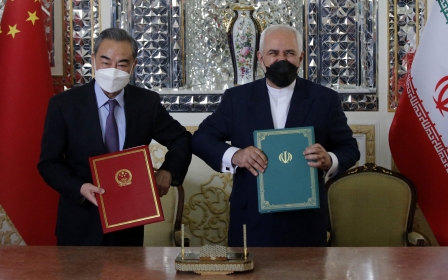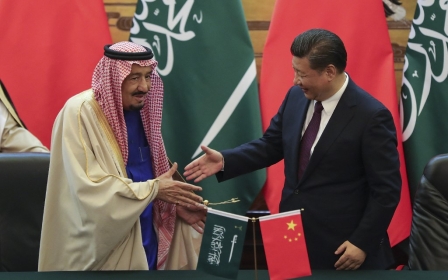Will China save Syria's economy after years of bloodshed and turmoil?

When Mohammad Kabalan heard China's Foreign Minister Wang Yi was visiting Syria last month, he decided to make the two-hour journey from Beirut to Damascus.
"The visit was a big deal and I wanted to be there to have information," the Lebanese businessman, who works as a consultant for Chinese companies looking to operate in the war-ravaged country, told Middle East Eye.
Wang's visit, which coincided with President Bashar al-Assad's swearing-in ceremony, was welcomed by the Syrian government with much fanfare and interpreted by Damascus as a major sign of support from Beijing.
The Chinese foreign minister hailed Assad's reelection with 95 percent of the vote as a sign of the country's strength - despite the result being widely rejected by the US and EU members - and extended an invitation to Syria to join China's Belt and Road Initiative (BRI).
"We welcome Syria to become a new partner in the Belt and Road Initiative," Wang said. "We support Syria in its opposition to unilateral sanctions so as to alleviate the humanitarian hardship."
New MEE newsletter: Jerusalem Dispatch
Sign up to get the latest insights and analysis on Israel-Palestine, alongside Turkey Unpacked and other MEE newsletters
Launched in 2013 by President Xi Jinping, the BRI is a multi-trillion-dollar development and investment initiative that seeks to help fund roads, railways and maritime routes in over 70 countries.
The project has seen China significantly expand its economic and political influence across Asia, Africa and the Middle East, raising concern among the US and its European allies.
The Assad government, like Kabalan, has been hoping political support lent by Beijing will come with financial investment to help Syria rebound as the devastating ten-year conflict winds down in much of the country.
"Syria wishes to join the Belt and Road initiative and strengthen co-operation with China on economy, technology, culture and education," Assad is reported to have told Yang, adding that Damascus would adopt a policy that "looks eastward".
According to the World Bank, Syria's economy is reported to be in even greater ruin than some of its bombed-out towns and cities, and has shrunk by more than 60 percent since the start of the Arab Spring uprisings.
With the economy further battered by US sanctions and the financial meltdown in neighbouring Lebanon, Assad has repeatedly tried to court Chinese investment for his post-war Syria.
"Economically speaking, the Syrian government has never suffered as much as it is now," Karam Shaar, president of the Operations and Policy Center, a Syrian research group based in Turkey, told MEE.
"If China wanted, they could rescue the Syrian regime," he added.
'Assad in desperate need of Chinese support'
Although Beijing has not deployed troops to Syria like Russia and Iran have, China has been a staunch public defender of Assad on the international stage, calling out western air strikes and defending Damascus at the UN.
Out of the 16 times it has used its veto power at the Security Council, 10 have been to shield the Assad government.
"China sees in Bashar al-Assad the person who will rule over Syria in the future and the regime is in desperate need of this diplomatic support," Natasha Hall, a scholar with the Center for Strategic and International Studies, told MEE.
Eliana Ibrahim, a Chinese national and president of the China-Arab Association for Promoting Cultural and Commercial Exchange, in Beirut, said she agreed with the political support Beijing offers to Assad, but questioned the basis on which deeper economic ties can be built.
The cost of Syria's reconstruction is estimated to be between $250 and $400bn. A massive sum for a country whose 2018 total budget was just shy of $9bn and is isolated from the global financial system.
'China is looking at the long road ahead and planning strategically'
- Natasha Hall, CSIS
"I ask where are the funds? Where is the return for China and where is our profit?' she said. "There are two conditions to work with China: politically you are my friend and economically we can both benefit."
While Gulf states like the United Arab Emirates (UAE) and Saudi Arabia have been warming to Damascus, it remains unclear whether they could bypass US and European Union sanctions on Syria.
Since retaking nearly 70 percent of the country, the Assad government has emphasised the favoured status allies like China will receive if they partake in rebuilding bombed-out areas.
"The Syrians really do believe they can get something from the Chinese," Shaar said.
In 2018, President Xi Jinping said Syria would have access to millions of dollars in aid and reconstruction funds. A year before that Beijing promised to invest $2bn in industrial parks throughout the country.
The financial support has yet to materialise. "So far I don't see any Chinese national-owned companies investing in Syria," Ibrahim said.
Making Money
China's economic footprint in the wider region has certainly been growing. In 2016, it became the largest foreign investor in the Middle East and North Africa, but its attention is largely concentrated on oil-rich Gulf states and more relatively stable countries like Egypt and Algeria.
Kabalan says it's not the security situation holding the Chinese companies back, but the economic crisis and western sanctions.
"The country is safe. The Chinese are more concerned about sanctions. They don't want to have problems with the Americans," he added.
While larger Chinese companies have sat on the sidelines, smaller private firms have emerged looking for niche sectors where they can make a profit in Syria's war-battered economy.
"These guys think of themselves as pirates," Shawn Tao, a Chinese security contractor who worked in Syria until 2018, told MEE when describing the entrepreneurs attracted to the country.
"So many Chinese businessmen have the adventurous spirit. They just say, 'let's go to Syria, I want to make money.' And most of them lose money, but some do make it," he added.
Dayun, a Damascus-based businessman who refused to give his last name, is among them.
He told MEE that he came to Syria three years ago in search of opportunities and established a business importing LED lights from China and selling them wholesale and retail.
The situation is difficult he said, "because of the war and currency devaluation, the people have no money".
Still, Dayun said he intends to stay and claims to know more entrepreneurs who will come to Syria from China.
According to Kabalan, the economic situation has made things difficult, but Chinese businesses are creative. Syria is suffering from severe oil shortages and a lucrative industry has grown around importing solar panels from China for projects financed by Syrian investors.
But with 80 percent of Syrians living in poverty and no sign of relief from western sanctions, the economic activities of China may be confined to small ventures for the near future.
"These are not attractive places for investors at the moment, but I think China is looking at the long road ahead and planning strategically," Hall stated.
Middle East Eye delivers independent and unrivalled coverage and analysis of the Middle East, North Africa and beyond. To learn more about republishing this content and the associated fees, please fill out this form. More about MEE can be found here.






